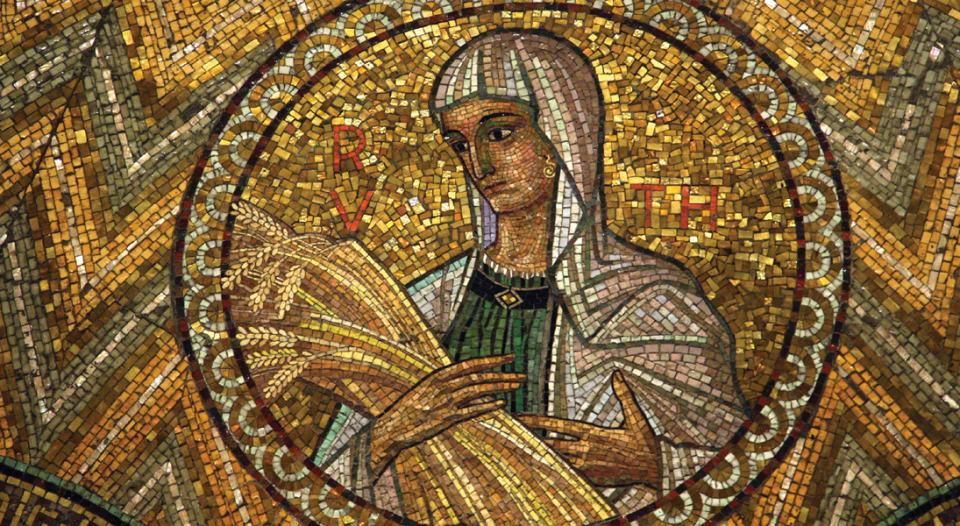Series editor’s note: Throughout 2023, “Deeper understandings” will feature biblical scholars reflecting on one of the books of the Old Testament. Rachel Wrenn will continue this theme in the next issue. —Kathryn A. Kleinhans, dean of Trinity Lutheran Seminary at Capital University, Columbus, Ohio, on behalf of the ELCA’s seminaries
Tina Turner famously sang, “What’s love got to do, got to do with it?” The question could also be asked of the book of Ruth, which is a story of human love and loyalty. But what’s (human) love got to do with God? The book of Ruth contains no burning bush, no angel message, no prophetic word. What does this ordinary tale of two widows and a farmer have to do with the life of faith?
Well, a lot, as it happens. Ruth is a story about the love and faithfulness of people for one another, which in turn reflects the love and faithfulness of God.
There is a particular Hebrew word for this kind of faithful love: hesed, and it occurs as something of a refrain in the book of Ruth (1:8; 2:20; 3:10). Hesed is translated in different ways: love, mercy, loving-kindness. One of my seminary teachers defined hesed as “love-in-action.” This isn’t the kind of frothy romantic love that fills Valentine’s Day cards. Rather, it’s the kind of love that works for the good of the beloved in concrete ways, in the sometimes boring, sometimes nitty-gritty stuff of daily life.
“God’s faithful love overflows into our lives as well.”
Take Ruth, for example. After her husband died, her most reasonable course of action would have been to return home, as Naomi urges Ruth and her sister-in-law Orpah to do (1:8). Orpah obeys Naomi, but Ruth shows her love for her mother-in-law by leaving her homeland and traveling to a place she has never seen (not unlike Abraham in Genesis 12). When they arrive, Ruth sets about the hard work of gleaning to provide for Naomi and herself. This is love-in-action.
Naomi is too lost in her understandable grief to recognize Ruth’s hesed. Upon arriving in Bethlehem, having lost her husband and two sons, Naomi says to the women of the village, “Call me no longer Naomi (‘pleasant’). Call me Mara (‘bitter’), for the Almighty has dealt bitterly with me. I went away full, but the Lord has brought me back empty” (1:20-21).
The narrator then adds: “So Naomi returned together with Ruth the Moabite, her daughter-in-law …. They came to Bethlehem at the beginning of the barley harvest” (1:22).
“I went away full,” Naomi says, “but I have come back empty.” Yet there beside her is Ruth. Naomi isn’t alone. Ruth’s hesed, her love for Naomi, manifests itself in concrete action and, despite what has come before, the promise of harvest is near.
Naomi’s eyes are opened
The rest of the story quickly unfolds. Ruth ends up gleaning in Boaz’s field (2:3). Boaz, a relative of her dead husband, notices her and commends her for caring for Naomi. Then he instructs his servants to pull out handfuls of grain for Ruth to glean—she ends up with about 30 pounds of barley.
Ruth brings home this astonishing amount of grain and Naomi, upon learning of Boaz’s generosity, says, “Blessed be he by the Lord, whose hesed has not forsaken the living or the dead!” (2:20). Naomi’s eyes are opened. It is when she begins to recognize the hesed of God in the loving-kindness of those around her that she moves from being Mara (bitter) back to being Naomi (pleasant).
At the end of the harvest, Ruth goes to Boaz at the threshing floor under cover of night. There she proposes to him, calling on him to fulfill his duties as her husband’s relative to care for her and Naomi (3:9; see also Leviticus 25:25 and Deuteronomy 25:5-10). Boaz recognizes that Ruth’s choice of him is another instance of her hesed (3:10).
Ruth and Boaz marry and have a son, Obed. The emptiness, barrenness and famine at the beginning of the book are forgotten as grain and new life and hesed overflow into the lives of Ruth, Boaz and Naomi.
The women of the village now say to Naomi about Obed, “He shall be to you a restorer of life and a nourisher of your old age; for your daughter-in-law who loves you, who is more to you than seven sons, has borne him” (4:15).
In that time and place, where sons were valued so highly, these women recognize the extraordinary gift that Ruth is to Naomi: “your daughter-in-law who loves you, who is more to you than seven sons.” Ruth’s hesed for Naomi—her love and faithfulness—has turned a desperately sad situation into one full of new life and hope.
Into the ordinary lives of two widows and a farmer, the hesed of God has overflowed like the mounds of barley on the threshing floor. That love has come not in a burning bush or a voice from heaven, but through the ordinary lives and the extraordinary love of people, one for another, called forth by God’s love for them.
The book of Ruth ends with this note: “The women of the neighborhood gave him a name, saying, ‘A son has been born to Naomi.’ They named him Obed; he became the father of Jesse, the father of David” (4:17).
Here is where the story of Ruth leaves us, with the promise of God’s faithful love overflowing, not just into the lives of two widows and a farmer but into the lives of all Israel and, through David’s greater Son, our Redeemer, and into our lives as well. Blessing upon blessing. Thanks be to God!





